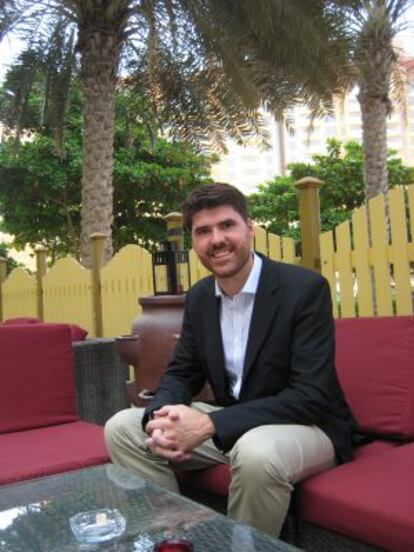“Sport can bring people of different cultures together”
A Spanish graduate is leading Saudi Arabia's sports program

Like growing numbers of young professionals whose career prospects at home have been stunted by the economic slump, which shows no signs of lifting any time soon, Joaquín Martínez began looking for work abroad after completing his Master in Management and Sports Marketing.
After an acquaintance put the 30-year-old in touch with a senior official at the Saudi Arabian Ministry of Education, he learned that the government there was interested in combating the growing problem of obesity, as well as laying the foundations for a national sports system by developing a strategy to take sport into schools and homes. So, along with a group of colleagues, Martínez put together a proposal.
The initial bid was accepted, and Martínez moved out to Riyadh at the end of last year to further develop the project. While he was excited about the opportunity, he also admits that to begin with he had his doubts about living in the Kingdom. "Five days after I arrived, I sent an email to my friends telling them that I wasn't sure I would be able to stand the heat, or accept the way that women are treated here, or deal with the fact that there is no public transport, or, above all else, cope with missing my family and friends," he says.
But he overcame his initial misgivings and threw himself into his work. "I am fascinated by the Middle East, and despite the huge differences, I really do believe that sport is the one thing that can bring people of different cultures together."
He says that he has found working with Saudis easier than he imagined, and has made friends. "This is a country where friendship is a very important part of the working relationship. If you don't let somebody down, and keep your end of the deal, then people here will really stand by you." When the initial period finished at the beginning of this year, and he handed in a detailed plan to develop a national sports program, it was accepted, and he was invited to stay.
He has experienced first-hand the struggle between the country's reformists and the old guard, and says that the acceptance of his project seems to suggest that the modernizers are gradually getting their way.
That is not to say that implementing a nationwide sports program is going to be easy: to begin with, women are still prohibited from taking part in physical education at school and college, and cannot compete in sporting events at national or international level.
"We are going to begin with sport and exercise in the family, in the home, which will allow women to take part. The important thing isn't so much that women start competing professionally, but simply that they begin to exercise, and the way to do that is through the family."
From his experience, Martínez believes that there are opportunities for Spanish companies to take advantage of the Saudi Arabian government's focus on sport.
"We've just sold them dozens of tanks and planes. Why not design sports infrastructure and help set up federations? They have a need, and we have the skills. Spain is a great sporting brand. People here love Real Madrid and Barcelona."
Tu suscripción se está usando en otro dispositivo
¿Quieres añadir otro usuario a tu suscripción?
Si continúas leyendo en este dispositivo, no se podrá leer en el otro.
FlechaTu suscripción se está usando en otro dispositivo y solo puedes acceder a EL PAÍS desde un dispositivo a la vez.
Si quieres compartir tu cuenta, cambia tu suscripción a la modalidad Premium, así podrás añadir otro usuario. Cada uno accederá con su propia cuenta de email, lo que os permitirá personalizar vuestra experiencia en EL PAÍS.
¿Tienes una suscripción de empresa? Accede aquí para contratar más cuentas.
En el caso de no saber quién está usando tu cuenta, te recomendamos cambiar tu contraseña aquí.
Si decides continuar compartiendo tu cuenta, este mensaje se mostrará en tu dispositivo y en el de la otra persona que está usando tu cuenta de forma indefinida, afectando a tu experiencia de lectura. Puedes consultar aquí los términos y condiciones de la suscripción digital.









































